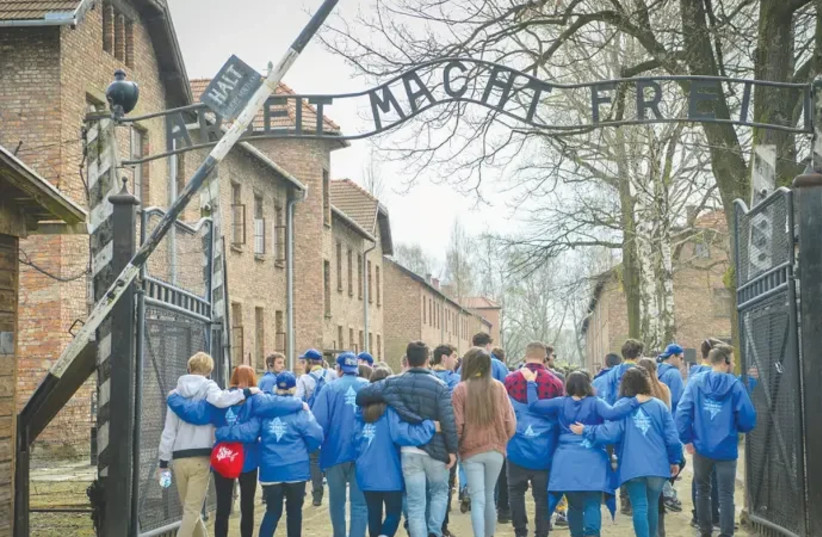I have always associated Poland with images of death and destruction. After all, my grandparents narrowly escaped from Poland just before the Holocaust, and I always considered our family one of the “lucky” ones. But during my recent four-day trip to Poland, my preconceptions dissipated as I witnessed many remarkable initiatives led by Jewish organizations to help Ukrainian refugees find safety on Polish soil. My eyes beheld countless acts of kindness and images of vibrant life, as I came to see that out of darkness, light can truly shine.
I was privileged to chair this mission with a group of senior leaders from Jewish Federations across the US and Canada, and witness first-hand the impact of Jewish Federations’ annual campaign dollars. Those dollars help build flourishing Jewish communities, relieve suffering, and support vulnerable populations in Israel and overseas. Together with our partners the Jewish Agency for Israel, JDC and World ORT, we could see the impact of the annual campaign dollars together with the emergency dollars that have powered the critical, timely response.
Our mission was filled with difficult moments, as well as uplifting ones, each one a motivation for my own Federation support. One of the most touching moments of the trip was our visit to a summer camp at the Lauder Morasha School for 80 Ukrainian children and teens fleeing the war. I expected to be met by gloom, as some of these children had fled by traveling 15 days by train and bus through dangerous territory. But the smiles on their faces told a story of resilience and proved that loving-kindness has the ability to uplift and heal.
The summer camp is an initiative led by JCC Warsaw together with JDC and other local Jewish organizations. Approximately one-third of the campers are Jewish and the rest come from a variety of faiths and backgrounds. Many of the staff at the camp were second- or third-generation Holocaust survivors who were joined by 10 Russian-speaking Jewish volunteers from the US, coordinated by Jewish Federations to serve this unique need.
I noticed the bright paintings that lined the corridors of the building. One six-year-old girl with a blonde braid who was immersed in an art project turned her head and flashed a bright smile at me. I could only imagine what this little girl suffered through to get to this point, but now she was able to have a fun and normative camp experience, thanks to the generosity of the Jewish community.

IT WAS AT the JCC Krakow where I met Zofia, an 86-year-old Holocaust survivor from Krakow. Zofia’s father was murdered in Auschwitz, just a short drive from where the JCC Krakow stands today. After the Holocaust, Zofia and her mother rebuilt their lives in Poland, where she would eventually go on to become a professor of constitutional law.
Zofia is the vice president of the Krakow branch of the Child Survivors of the Holocaust Organization, which recently donated its annual dues to help Ukrainian refugees. Like Zofia, many of the volunteers at the JCC Krakow are Holocaust survivors who are giving their time and resources toward aiding Ukrainian refugees. “We have to help them,”she implored us. “This could have been us.”
Housing refugees
At two different JDC and Jewish Agency for Israel hotels set up to house refugees, I witnessed the generosity of the community. In several hotel rooms, transformed into “free stores,” I could not believe how neatly the supplies were laid out and how each piece of clothing was pristinely folded.
One of the staff members explained that this is done so that when the refugees arrive, they will feel a sense of dignity. As Michael Schudrich, the chief rabbi of Poland, told our group, “We succeeded in saving them from death. Now we must give them life.”
What struck me most were the shoes of all shapes and sizes: pretty party shoes for a little girl playing dress-up and sneakers for a teenage athlete practicing for a competition, and tiny shoes for a baby learning to walk.
The sight conjured another image of shoes – the gut-wrenching pile of shoes at Yad Vashem that were worn by Jews on the way to their death. But the shoes I saw in Poland represented comfort. Each shoe will fit the foot of a refugee whose life was torn to pieces and will help that individual take strides toward a better future.
The juxtaposition was one that none of us could ignore – a short distance from the gas chambers of Auschwitz, Holocaust survivors are assisting Ukrainian refugees and providing them with nourishment. Just blocks away from where the Warsaw Ghetto once stood, a summer camp organized by the Jewish community is bringing hope to refugee children.
Eighty years ago, Jews would have done anything to escape Poland. Now Jewish organizations in Poland are leading efforts to ensure that Ukrainian refugees – many of whom are Jewish - will have a future and live in dignity. Not only did I have the opportunity to see the impact of Jewish Federation dollars, but I left Poland with new images in my mind of the country’s Jewish community that is bringing hope to those fleeing war and renewing life where death once reigned.
The writer is the treasurer of the Board of Jewish Federations of North America.
